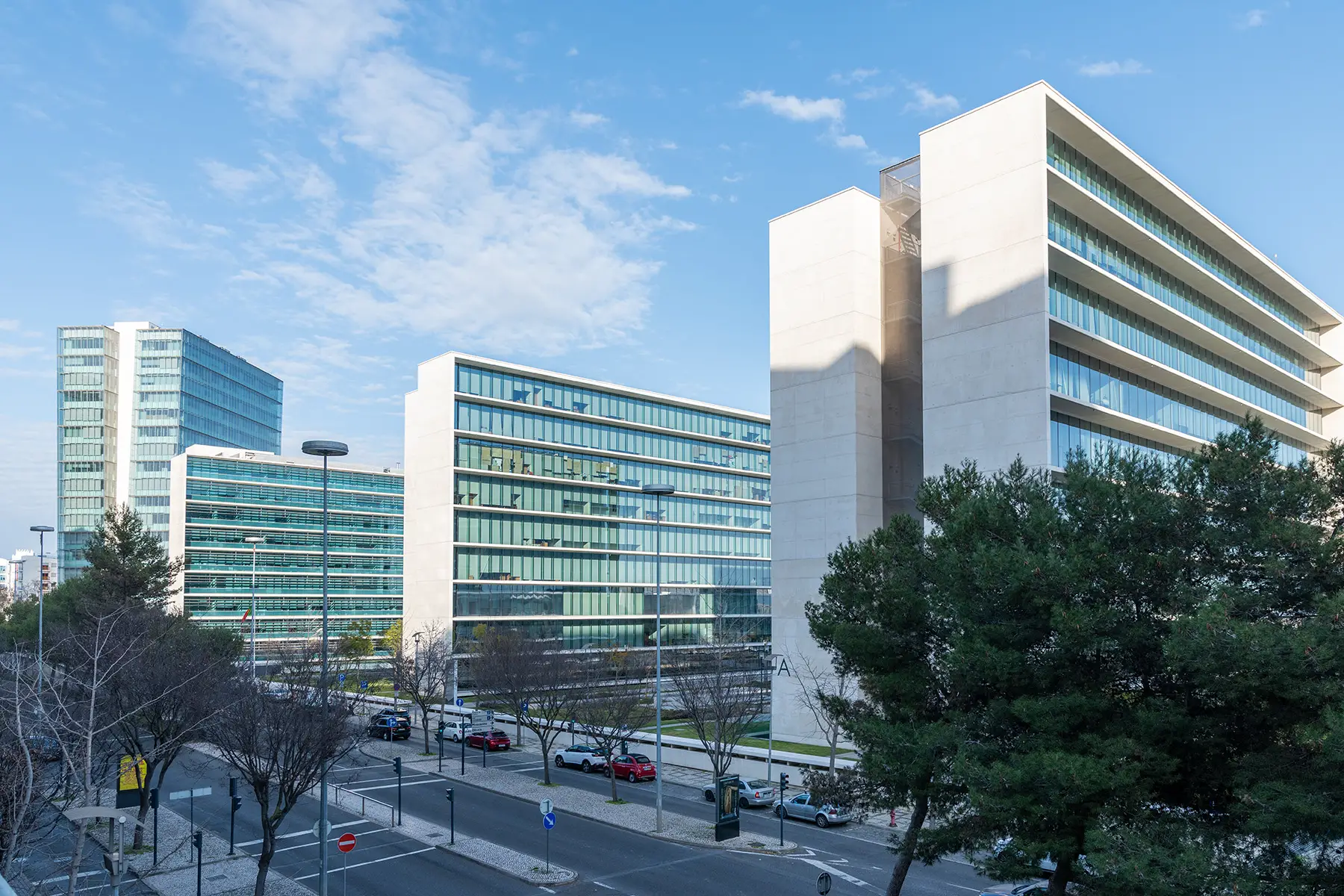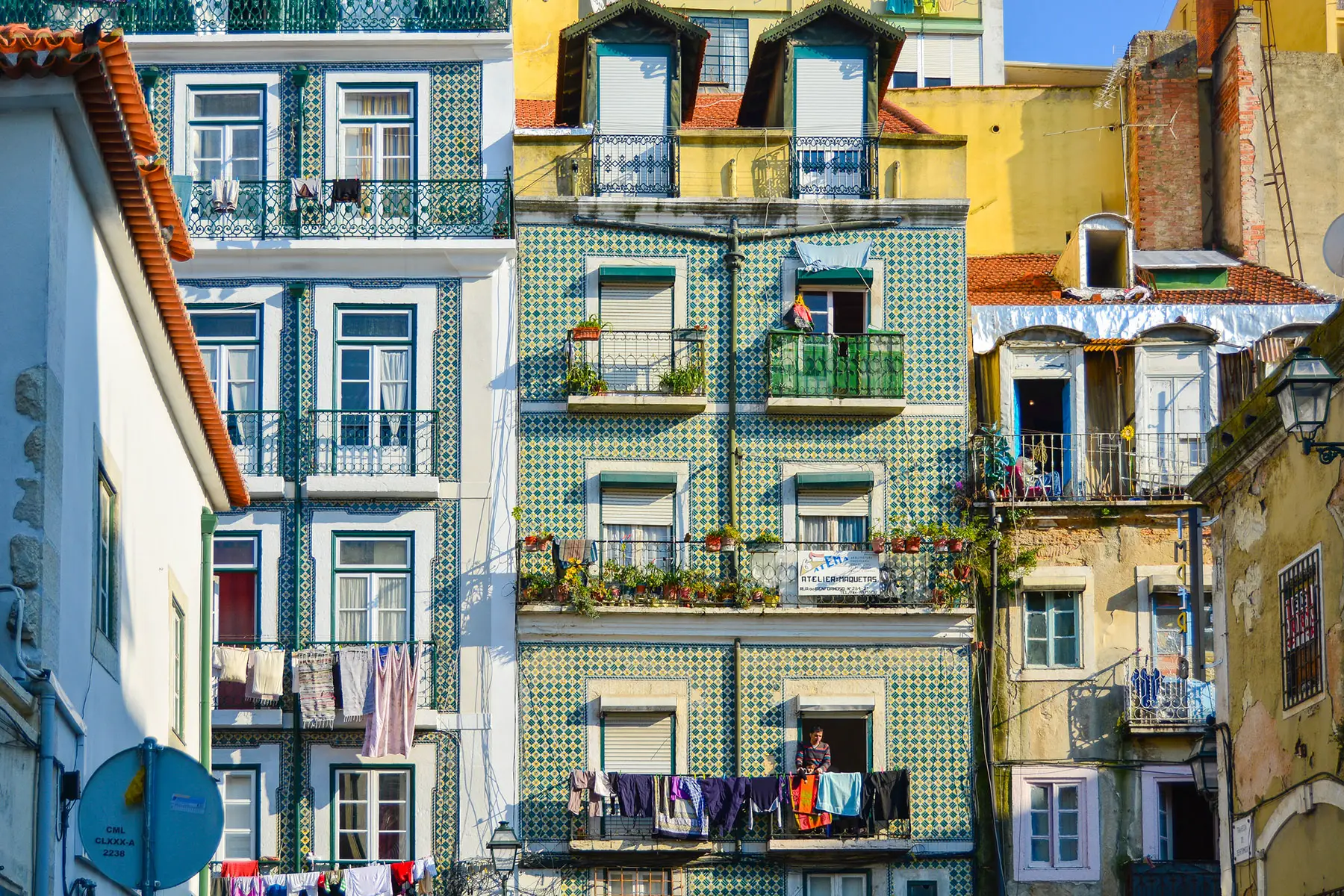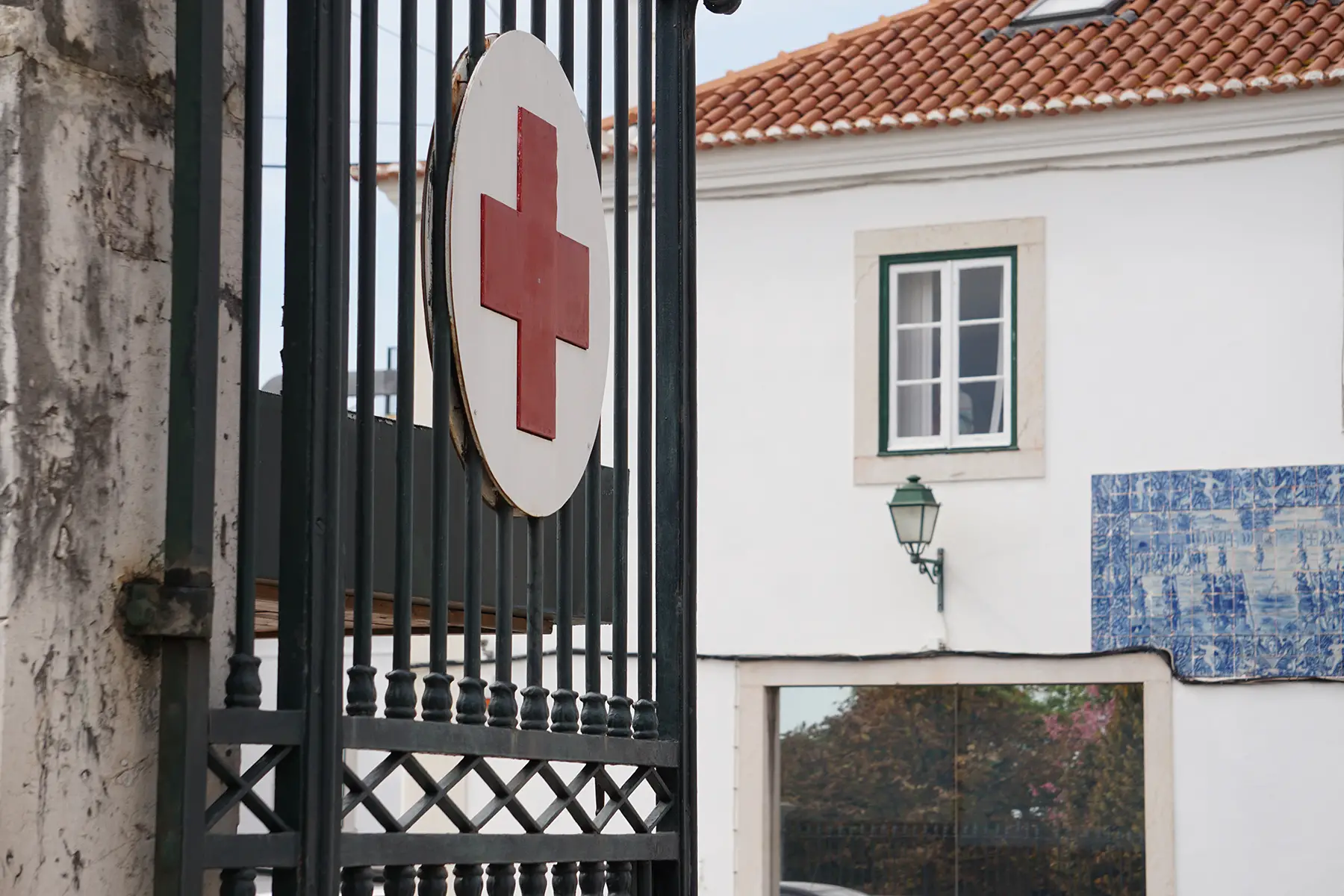With its stunning coastline, vibrant cities, and warm Mediterranean climate, it’s no surprise that Portugal is a popular destination for expats. But how does the cost of living stack up?
From everyday expenses like groceries and utilities to housing and healthcare, this article will give you a clear overview of what it really costs to live in Portugal in 2025.
Continue reading for the following information:
Is Portugal’s economy good?
Portugal is – somewhat surprisingly – in the mid-tier of economies in the European Union (EU). Its gross domestic product (GDP) is €266 million (2023), which the European Commission predicts will grow by 1.7% in 2024 and 1.9% in 2025, above the EU average of 1.0% and 1.6%, respectively.
While €266 million sounds a lot, it’s all a matter of perspective. For example, Germany (the largest economy in the EU) has a GDP of €4.12 billion. Meanwhile, Romania, which traditionally has the reputation of having an underperforming economy, has a GDP of roughly €325 million.

Inflation and disposable income in Portugal
Portugal’s GDP works out to €25,757 per capita (2023). However, the equivalised disposable income (i.e., the total net income of all household members divided by the weighted number of household members) is even lower: €11,824 per person. This is well below the EU average of €20,350 per person (2023).
Despite this conceivably low income, just 5.9% of the Portuguese population is at risk of poverty. A mere 2.3% of people can’t afford a meal with meat, chicken, fish, or a vegetarian equivalent every second day. Compared to other EU member states, only Ireland and Cyprus fare better.
This remarkable result is likely credited to the country’s excellent social security system. Our article on minimum wage in Portugal explains average salaries and incomes in more detail.
In terms of purchasing power, Portugal’s average headline inflation for 2025 and 2026 is projected to be 2.1% and 1.9%, respectively. These numbers are below the European Union’s average of 2.4% and 2.0%.
The cost of living in Portugal in 2025
According to Statistics Portugal (Instituto Nacional de Estadística –INE), the average annual expenses per household member were €23,900, or €1,992 per month (2022/2023). With an inflation rate of 2.6% in 2024 and 2.1% in 2025, the average cost of living spending per region in Portugal will be an estimated:
| Annually 2022/2023 | Annually 2025 | Monthly 2025 | |
| North (Norte) | €23,245 | €24,350 | €2,029 |
| Center (Centro) | €22,222 | €23,279 | €1,940 |
| Lisbon Metropolitan Area (AM Lisboa) | €26,891 | €28,170 | €2,347 |
| Alentejo | €21,359 | €22,375 | €1,865 |
| Algarve | €24,432 | €25,594 | €2,133 |
| Azores (RA Açores) | €19,431 | €20,355 | €1,696 |
| Madeira (RA Madeira) | €22,605 | €23,680 | €1,973 |

Keep reading for an overview of the cost of living expenses you might come across in your daily life.
The price of groceries in Portugal in 2025
Beer, wine, and liquor
Portugal offers some great alcoholic beverage choices, from Vinho Verde to Ginja and everything in between. In 2023, the country was the fifth-largest wine exporter in the EU after France, Italy, Spain, and Germany. Portuguese drinkers consume around 8.6 liters of pure alcohol per year (2020), with most people preferring wine.
A local beer in a bar or restaurant costs between €1.20–4.00, which goes up to €5–7 for craft brews. A glass of wine, on the other hand, will set you back around €3–5.
Alcohol is – naturally – cheaper in supermarkets. You can expect to find a domestic beer for as little as €0.85–3, depending on the make and size. A decent wine will set you back €2–6 per bottle. The price of most liquor (e.g., poncha, rum, or whiskey) starts from €10–20, depending on your drink of choice.
Food and drink
Food and non-alcoholic drinks are the second-largest expenses after housing costs. Interestingly, most of the grocery money went to meat (7.1%), bread and cereals (4.6%), and fish and other seafood products (4.3%).
Portuguese households will spend an estimated €270 per month on groceries in 2025.

The average price ranges* of basic supermarket items include:
| Product | Price range | Product | Price range |
| Apples (1 kilo) | €1.20–3.00 | Potatoes (1 kilo) | €1.20–5.20 |
| Bread (1 loaf) | €1.20–2.90 | Regular milk (1 liter) | €0.80–1.10 |
| Cheese (1 kilo) | €7.25–25.00 | Rice (1 kilo) | €1.25–3.80 |
| Coffee (1 kilo) | €9.00–24.05 | Tea (per bag) | €0.03–0.22 |
| Eggs (12) | €1.80–5.20 | Tomatoes (1 kilo) | €1.20–2.30 |
| Orange juice (1 liter) | €0.99–7.15 | Water (1 liter) | €0.15–0.65 |
Hygienic and household products
Hygienic and household products include everything from toothpaste and shampoo to dish soap (or washing-up liquid) and toilet bleach. The average price ranges* of these necessities include:
| Product | Price range | Product | Price range |
| All-purpose cleaner (1 liter) | €0.50–2.55 | Shampoo (1 liter) | €1.77–13.30 |
| Deodorant (100 ml) | €1.60–5.50 | Soap (1 liter) | €1.90–8.00 |
| Dish soap (1 liter) | €0.90–6.30 | Tampons (per tampon) | €0.06–0.23 |
| Garbage bags (per bag) | €0.06–0.37 | Toilet paper (per roll) | €0.19–0.75 |
| Laundry detergent (per wash) | €0.07–0.63 | Toothpaste (100 ml) | €1.20–6.50 |
2025 housing costs in Portugal
In Portugal, the average monthly housing costs will be an estimated €820 per household (2025). This includes rent and mortgage payments, water, electricity, gas and other fuels. Interestingly, INE reports that homeowners have 1.5 times higher cost of living expenses than renters in Portugal.

Rent and property prices
Housing prices vary significantly throughout Portugal. Houses in Lisbon, Porto, and other famous cities are comparatively more expensive than those in rural and less popular areas.
As of December 2024, the average monthly rent for a home in Portugal is €16.20 per square meter (typically around €1050 in total). Potential homeowners will pay an average of €2,827 per square meter for a property (or about €399,228 in total).
The average real estate prices (depending on the location) are as follows:
| Average monthly rent* | Average rent per square meter | Average property price* | Average property price per square meter | |
| Braga | €1,039 | €9.80 | €209,350 | €1,975 |
| Cascais | €2,141 | €20.20 | €557,454 | €5,259 |
| Faro | €1,495 | €14.10 | €334,642 | €3,157 |
| Lisbon | €2,310 | €21.80 | €606,108 | €5,718 |
| Porto | €1,876 | €17.70 | €392,730 | €3,705 |
The most expensive places are Lisbon, Cascais, Loulé, and the Algarve. However, if you’re looking to live in Portugal on a budget, the cheapest cities to move to are:
| Average monthly rent* | Average rent per square meter | Average property price* | Average property price per square meter | |
| Vila Nova de Foz Côa | €220 | €2.08 | €54,696 | €516 |
| Vila Flor | €243 | €2.29 | – | – |
| Trancoso | €255 | €2.41 | – | – |
| Belmonte | €277 | €2.61 | €54,696 | €516 |
| Baião | €298 | €2.81 | €80,666 | €761 |
You can learn more about the real estate market and property prices by visiting our article on buying property in Portugal. For students, cou can also check out available rentals at Uniplaces.
Our country article on where to live highlights popular residential areas for expats.
Utility bills: water, gas, electricity
Utility prices in Portugal are both higher and lower than those of other EU countries. For example, water and electricity cost less than the EU average, while gas costs more.
In April 2024, water cost an average of €1.7/cubic meter. However, there are many discrepancies between regions; one study found that the overall water bill could differ by more than €650.
During the second half of 2023, households paid €0.0995 kilowatt/hour for gas (EU average: €0.0891). The average price for electricity was €0.2012 kilowatt/hour (EU average: €0.2226).

While prices vary considerably from region to region, average monthly expenses range between €100 and €200, depending on your use and property size.
It’s worth noting, however, that many properties don’t have central heating and rely on space heaters or air conditioning units to keep things comfortable. As such, during extreme weather, your utility bill may double or even triple.
You can find out more about utility prices and providers in our article on utilities in Portugal.
The cost of healthcare in Portugal
Everyone living and working in Portugal must register for the healthcare system. While all medical treatment is free, prescription medication and some procedures are excluded from the coverage.
Local and expat residents often choose to take out additional private health insurance to get faster access to treatment and extra coverage. Basic insurance packages start around €30–50 a month, and costs go up with the insurance plan.
In 2025, the estimated monthly cost of healthcare in Portugal is €81 per household.
Internet and telecom prices
The cost of internet and other telecommunication services vary depending on several factors, including your location and the type of connection or service. Telecom packages typically include internet, TV, and home phone.

You can install internet for around €40–50 a month. If you choose the same provider for your mobile phone contract, you can also get a discount.
In 2025, the average monthly cost of internet and telecom is estimated to be around €80 per household.
The cost of clothing and footwear
The price of clothes and shoes is in line with other EU countries. In 2025, people will spend a monthly average of €34 per household on their wardrobe.
In Portugal, the cost of living for clothing and footwear varies greatly, depending on the type and brand. For example, underwear costs around €1–8. Dresses and jeans, on the other hand, cost between €20–120. Business shoes for men and women range from €50–175.
The cost of transportation in Portugal
In Portugal, households are estimated to spend an average of €252 per month on transportation (2025).
Public transport
All major cities in Portugal have a convenient public transportation network of buses, metros, trains, and, in some places, trams. These are run locally, so fares and availability differ on where you are.

According to Numbeo’s cost of living in Portugal, a single bus fare costs €2.75 in Faro, and €2.00 in Lisbon and Porto.
If you are planning to commute to work, it’s recommended to get a monthly or yearly plan to travel at a discounted cost. You can also explore and book your travel options on online platforms such as Omio.
Driving and vehicle costs
Having a vehicle is a costly business in Portugal. According to the 2022 Car Cost Index, it is the fourth most expensive country in Europe to own a car, after Switzerland, Norway, and the Netherlands. Portuguese drivers paid an average of €1,160 a year. This is about €1,215 in 2025 money.
Beyond the costs of lessons, a driving license, and the actual purchase of the vehicle, you’ll need to budget for:
- Car insurance – the mandatory Third Party Liability insurance cost between €150 and €350 a year
- Annual Road Tax – the amount is largely based on your vehicle, fuel type, and your region
- Fuel costs – as of January 2025, gasoline costs €1.75 per liter, and diesel costs €1.64 per liter
- Maintenance – cars must periodically pass inspection, which usually costs around €18-36 depending on the vehicle type
Learn about the costs, mandatory insurance, and driving regulations by reading our article on driving in Portugal.
How much does leisure and entertainment cost?
In 2025, Portuguese households will spend roughly €69 per month on leisure, recreation, sports, and culture, and €179 per month on restaurants and hotels.

Movie theaters and cinemas
The average cinema ticket in Portugal costs around €7.80–14.00, depending on the location. Some movie theaters also have discounted days and tickets, offering a screening for as low as €6.20.
Restaurants
Depending on your tastes and night, dining out doesn’t have to be expensive. An inexpensive restaurant will charge you €7–€15 for a meal, while a three-course meal will set you back about €30–€60.
Of course, restaurants are more expensive in heavily touristed areas.
Sports
Gym memberships cost around €25–50 per month, depending on the club and location. It’s worth trying out different gyms before signing up for a membership.
The cost of Portuguese education and childcare
On average, Portuguese households will spend roughly €29 per month on education.
Childcare
Working parents with (young) children may need to arrange for childcare from time to time. In Portugal, options include daycares, independent childminders, nurseries, and preschools.
Residents can send their offspring to free public childcare facilities, which usually charge only for meals and outings. However, places are sparse, and many families opt to enroll their kids in private (international) childcare, costing from €350 to €1,800+ a month.

Non-resident expats may also hire a nanny or au pair. Nannies have an average hourly rate of €8, whereas au pairs require room and board, as well as a minimum salary of €200–400 a month.
Children’s education
Public schools in Portugal are funded by the government. There are no tuition fees, and parents only pay for books, materials, and outings.
If you prefer to send your children to an international or private school, you will need to pay school fees. These vary greatly depending on the school’s location and curriculum. For example, the cost of international primary and secondary schools ranges from €8,400–€20,000+ per year.
Discover more about school curriculums and fees by reading our article on international schools in Portugal.
University tuition fees
While not completely free (like those in Austria or Germany, for example), Portuguese universities are much more affordable than elsewhere around the world.
Public universities generally charge less than €1,500 a year for a bachelor’s or master’s degree. Tuition fees at private universities are a bit higher and can reach up to €4,000 per year.
Our article on studying in Portugal explains more about the topic, including degree programs and costs.
How does Portugal compare to the rest of the world?
Portugal scores relatively low on the OECD Better Life Index, especially when it comes to income and education. However, water and air quality score more highly than the OECD average.
Despite these low scores, Lisbon comes in at 27th on the 2024 Mercer’s quality of living index. This is below Amsterdam (6th) but above Paris (34th), London (40th), and Milan (42nd).
Earnings may be lower in Portugal than in other comparable West-European countries, but the cost of living is substantially lower, too.

The cost of living in Lisbon
The cost of living in Lisbon is cheaper than many other capital cities. The metropolis ranks 27th on the 2024 Mercer’s cost of living index, meaning it is considerably more comfortable to live in than Barcelona (Spain), Tokyo (Japan), and Prague (Czechia).
Compared to other capital cities, Lisbon’s cost of living is (as of January 2025):
- 59.6% cheaper than New York (the US)
- 42.5% cheaper than London (the UK)
- 31.9% cheaper than Amsterdam (the Netherlands)
- 22.8% more expensive than Luanda (Angola)
- 102.5% more expensive than Brasília (Brazil)
- 142.7% more expensive than Praia (Cape Verde)
- 164.5% more expensive than Delhi (India)
The cost of living in Porto
Mercer ranks Porto 51st in its charts, just above Madrid (Spain). Compared to major cities around the world, Porto’s cost of living is (as of January 2025):
- 65.4% cheaper than New York (the US)
- 50.7% cheaper than London (the UK)
- 41.6% cheaper than Amsterdam (the Netherlands)
- 5.3% more expensive than Luanda (Angola)
- 73.6% more expensive than Brasília (Brazil)
- 102.5% more expensive than Praia (Cape Verde)
- 126.8% more expensive than Delhi (India)
The cost of living in Coimbra
Coimbra is Portugal’s fourth-largest city – the total population of its metropolitan region is around 140,800 people (2023). It’s home to the oldest academic university in Portuguese-speaking countries and is currently a major attraction among tourists for its monuments and history.

The cost of living in Coimbra is typically cheaper than in Lisbon or Porto (as of January 2025):
- 70.6% cheaper than New York (the US)
- 58.1% cheaper than London (the UK)
- 50.4% cheaper than Amsterdam (the Netherlands)
- 10.5% cheaper than Luanda (Angola)
- 47.5% more expensive than Brasília (Brazil)
- 77.9% more expensive than Praia (Cape Verde)
- 92.7% more expensive than Delhi (India)
The cost of living in Braga
Braga is an attractive destination for expats located in northern Portugal. Its growing international community enjoys excellent public transportation, green spaces, and a mild climate, contributing to a high quality of life.
As of January 2025, the cost of living in Braga is:
- 70.7% cheaper than New York (the US)
- 58.3% cheaper than London (the UK)
- 50.6% cheaper than Amsterdam (the Netherlands)
- 10.9% cheaper than Luanda (Angola)
- 46.9% more expensive than Brasília (Brazil)
- 74.4% more expensive than Praia (Cape Verde)
- 91.9% more expensive than Delhi (India)
Financial support for the cost of living in Portugal
Portugal’s high cost of living is a major point of concern, especially among the younger generation.
Portuguese workers are increasingly holding down multiple jobs or leaving the country altogether. It’s also been reported that “the rising house prices and inflation are creating a new type of homeless person in Portugal: socially integrated people who are being pushed towards exclusion”.

There are several options for financial aid that can help you with the cost of living in Portugal. For example, low-income households can apply for Social Integration Income (Rendimento Social de Inserção – RSI) if they earn less than €237,25 a month.
Other social security benefits include:
- Child benefits or family allowance – Portugal offers several child benefits to help with the cost of raising a child
- Disability pension – available to low-income people living with invalidity or an occupational disease
- Informal carer allowance – for primary caregivers who look after a dependent family member
- Unemployment benefits – for previously-employed workers
If you are unable to pay for food and groceries, you can contact your local social services. They will assess your situation and may register you with a food bank (Banco Alimentar) in your area.
Tips on how to save money in Portugal
All affordability is relative to your household income and size. A single bachelor may have more to spend than a family of four. Here are some tips for saving money while living in Portugal:
- Shop smartly at local markets – local markets often have fresh produce, bread, and other goods at a lower price than supermarkets. Time your visit well: there are better deals around closing time when vendors try to clear their stock.
- Dine out strategically – when you are eating out, look for pratos do dia specials, as these are often more affordable than other food dishes. There are also many discount platforms (such as TheFork) that offer bargain outings.
- Embrace cycling, public transport, and ride-sharing services – Portugal has a well-connected public transport system and is bike-friendly. Opt for a monthly or yearly transport pass or use a bike instead of driving. For longer commutes, consider carpooling with colleagues or friends or using a ride-sharing app to lower your travel costs.
- Shop at second-hand stores – Portugal has many charity shops (Lojas de Caridade) and second hand stores (Segunda Mão) where you can find affordable clothing, furniture, and household items. It’s also eco-friendly!
- Use energy wisely – save on heating and electricity by insulating your home, using energy-efficient appliances, and taking advantage of off-peak energy tariffs (e.g., to do your washing). You can also lower the thermostat a little and wear double layers inside the home.
- Review your contracts – regularly compare energy, internet, and phone plans to ensure you’re getting the best deal.
Useful resources
- Portuguese Association for Consumer Protection (Associaçáo Portugesa para a Defesa do Consumidor – DECO) – website of the largest consumer association in Portugal
- Portuguese Federation of Food Banks (Federação Portuguesa dos Bancos Alimentares) – website with information on food banks in Portugal














